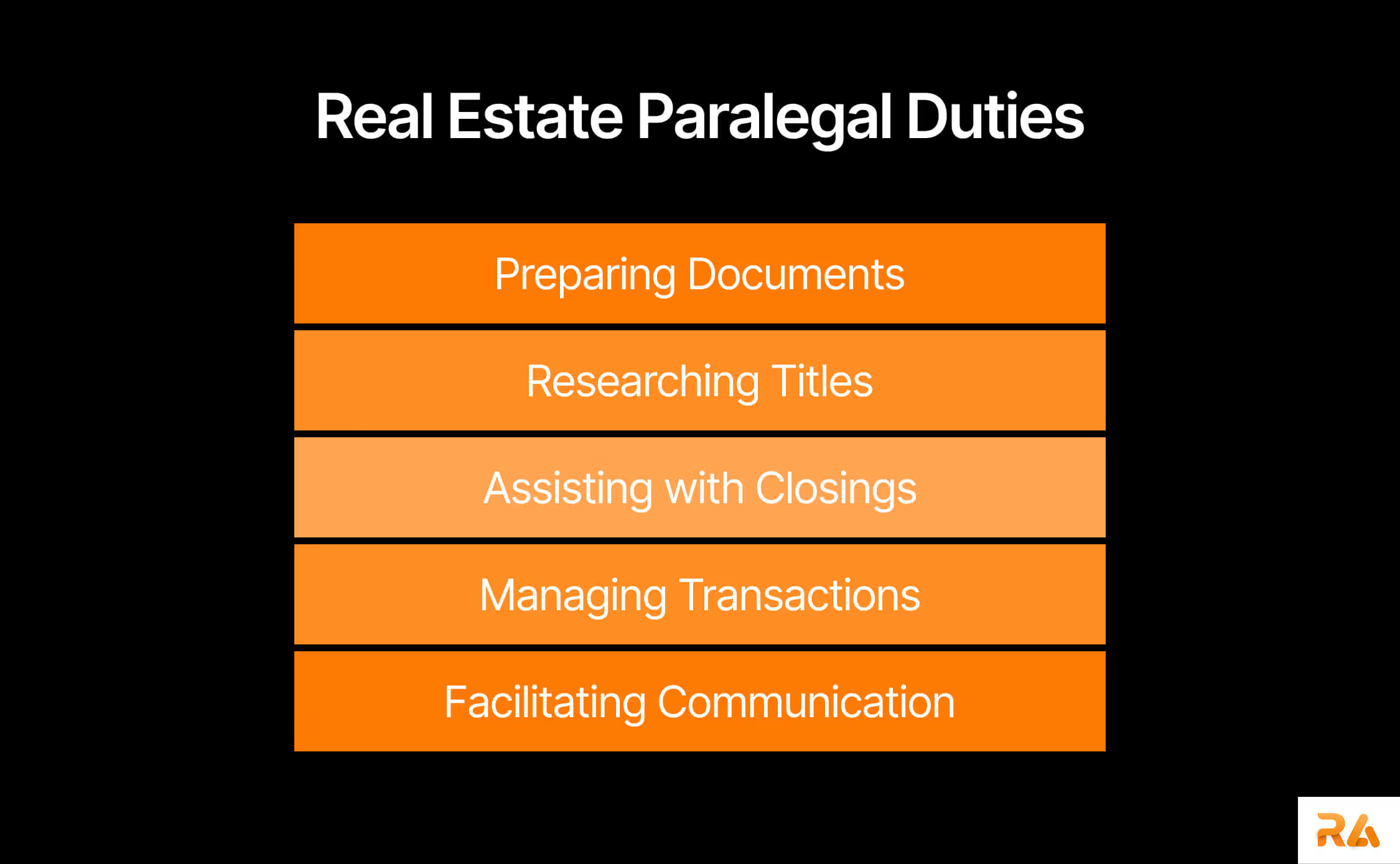Real estate paralegals are the unsung heroes behind every successful property transaction. They're the professionals who manage the details and turn complex legal requirements into smooth closings.
But have you ever wondered what goes on behind the scenes in a day in the life of a real estate paralegal in a law firm? Whether you're considering a career as a real estate paralegal or curious about the role they play in property closings, you’ll find answers here.
What is a Real Estate Paralegal?
A real estate paralegal is a legal professional who supports attorneys in all aspects of property law, handling the legal matters related to real estate transactions. These tasks include drafting documents, performing research, closing, and ensuring that all transactions comply with local, state, and federal regulations. They possess expertise in property transactions, zoning regulations, title work, and real estate financing.
Real estate paralegals work in various settings, such as law firms, real estate agencies, or title insurance companies. They often focus on residential or commercial real estate, depending on the scope of their law firm or employer.
Furthermore, real estate paralegals often serve as a point of contact between all parties involved in a transaction. Their role requires a strong grasp of legal knowledge, attention to detail, and project management skills. They must stay up-to-date with regulations while handling transactions simultaneously, each with its own timeline and requirements.
Real Estate Paralegal Job Responsibilities

Unlike attorneys, paralegals cannot give legal advice, but their behind-the-scenes work is crucial to ensuring smooth real estate closings. Real estate paralegal helps prepare and review contracts related to property transactions. However, their scope of duties vary depending on the size of the law firm but typically include the following main responsibilities:
Preparing Documents
Accuracy in documentation can mean the difference between a smooth closing and a legal nightmare. Your real estate paralegal brings precision to every purchase agreement, lease document, deed, and closing statement they prepare while checking that everything meets local requirements. Their trained eye catches potential issues in legal documents long before they can derail a transaction or create future liability.
Researching Titles
Property ownership history tells a story, and your real estate paralegal knows how to research and analyze it. They dive deep into title commitments to uncover encumbrances, liens, or other issues that could affect ownership rights. When working with title companies to resolve discrepancies, they bring legal knowledge and negotiation skills to find practical solutions. They also check surveys to make sure property lines are correct and identify any boundary disputes or easement problems that could affect the sale.
Assisting with Closings
Your paralegal plays a key role in making closings happen smoothly. They prepare closing binders with all necessary documents, coordinate with title companies to schedule closing appointments, and ensure all parties have what they need before the meeting. During closings, they often attend to help explain documents, witness signatures, and handle any last-minute issues that come up. After closing, they manage the distribution of funds and documents to all parties involved.
Managing Transactions
Think of your real estate paralegal as the conductor of an orchestra. They orchestrate entire transactions from the initial contract signing through the final closing handshake. This role requires them to maintain organized transaction files while simultaneously tracking dozens of deadlines that could make or break a deal.
Beyond simple scheduling, they actively coordinate with buyers, sellers, agents, lenders, and attorneys to ensure every moving piece falls into place. They ensure that contingencies are met, inspections are scheduled, and financing requirements are satisfied within specified timeframes.
Facilitating Communication
Perhaps most importantly your real estate paralegal is the reassuring voice that guides anxious clients through one of life’s most significant transactions. They excel at translating legal procedures into understandable terms while providing regular status updates to keep everyone informed. Their ability to gather necessary documentation efficiently while maintaining warm professional relationships directly enhances your firm’s reputation and increases client satisfaction throughout the transaction process.
Day in the Life of a Real Estate Paralegal
To understand how a real estate paralegal spends their day, we interviewed one of our top-performing staff members. She walked us through the exact tasks she handles on a typical workday as a fully remote real estate paralegal. Here's an example of how one might spend their workday:
To understand how a real estate paralegal spends their day we interviewed one of our top performing staff members. She walked us through the exact tasks she handles on a typical workday as a fully remote real estate paralegal. Here’s an example of how one might spend their workday:
1. Morning Email and Priority Check (8:00 AM)
I start each day with a cup of coffee and head straight to my email inbox to check for overnight updates. Title companies often send updates after hours, and lenders frequently add new requirements late in the day. I scan through everything to see if anything urgent affects today’s scheduled activities.
Most mornings I receive about 7-9 emails that need immediate attention. I sort these by deadline and make notes about which transactions need my focus first. If a closing is scheduled for later in the week, I check to make sure all the preliminary work is on track. This morning routine helps me stay organized and sets me up for a productive day.
2. Document Review (8:30 AM)
The morning is when I tackle the heavy document work while my mind is fresh. I review any title commitments that came in overnight, analyze survey reports, and prepare closing documents for upcoming transactions.
This includes title commitments, survey reports, and loan documents from various lenders. I review each document carefully to make sure all the information matches what we have in our files.
If I find any discrepancies, I flag them for the attorney's review. For example, if a survey shows different property boundaries than what's listed in the purchase contract, that needs to be resolved before we can move forward.
3. Client and Vendor Communication (10:00 AM)
I spend time calling clients to provide updates on their transactions. Real estate deals make people nervous, so regular communication helps keep everyone calm. I explain what stage we're at in the process and what's coming next.
Today, I spoke with three clients. One needed to submit bank statements to their lender, and the others had questions about their final walkthrough. I also coordinated inspection schedules and followed up with real estate agents on document delivery. It’s like being a project manager for multiple deals at once.
4. Research and Compliance Tasks (10:30 AM)
Real estate transactions often require research. I might dig into zoning restrictions for commercial properties, or verify permit status for ongoing construction. This work takes patience and a strong understanding of where to find reliable information in local government records and online databases.
5. Lunch and Continuing Education (12:00 PM)
I try to use my lunch break to relax and recharge. Since I work remotely, I stay alert for any urgent notifications. If something comes up, I quickly address it, then pause my lunch timer and resume it after I’ve handled the task.
6. Transaction Coordination and Problem-Solving (12:40 PM)
Afternoons often bring the unexpected issues that need immediate attention. I might work with a title company to resolve a lien payoff problem, or help clients gather legal documentation that lenders suddenly request. Problem-solving is a huge part of what I do every day.
7. Closing Preparation (3:30 PM)
As closing dates get closer, I ramp up my preparation efforts. This involves organizing all documents in the correct order, double-checking that everything is signed and notarized properly, and preparing the settlement statements.
I also confirm the closing time and location with all parties involved. File organization becomes critical at this stage because I need to prepare transaction records for both attorneys and clients. Last-minute confusion can easily delay a closing.
8. End of Day Wrap-Up (4:30 PM)
I usually spend the last few minutes of my day updating our transaction tracking system and preparing tomorrow’s priority list. I send brief status updates to the attorneys I work with so they know where each deal is at. This wrap-up helps me start the next day organized and ready to go.
Market Insights and Outlook
The demand for skilled real estate paralegals continues to grow as the property market regulations become more complex. The real estate market is projected to grow at an annual rate of 2.69% from 2025 to 2029, reaching an estimated market volume of US$727.80 trillion by 2029. This positive market outlook directly impacts law firms specializing in real estate and is driven by several key factors.
Population growth and urbanization creates consistent demand for both residential and commercial real estate services. As communities expand and develop, the need for legal expertise in zoning, land use, and property development creates ongoing opportunities for specialized paralegals. In fact, according to the U.S. Bureau of Labor Statistics, there are projected to be about 37,300 job openings for paralegals and legal assistants each year.
Geographic trends also influence demand. In 2025, the mean annual salary for a real estate paralegal was $70,513. Metropolitan areas and fast-growing communities typically offer much higher salaries than smaller towns. However, with the rise of remote work, experienced paralegals can now serve clients across broader geographic regions, further expanding their career prospects.
Education of a Real Estate Paralegal
A real estate paralegal isn't required to obtain a law license like an attorney, but most positions require at least a bachelor’s or associate’s degree. Earning a certification from the American Bar Association (ABA) or Thomson Reuters Westlaw, particularly with a focus on real estate, is a valuable advantage that can boost your career opportunities and earning potential.
Equally important is developing the right skills and gaining in-depth knowledge of real estate law through hands-on experience, such as working in real estate companies. These are often your strongest assets, especially when competing for law firm roles against other candidates who may have similar education and certifications.
The Challenge of Being a Real Estate Paralegal
Being a real estate paralegal is a rewarding career, but it comes with its own set of challenges. Tight deadlines are constant, as real estate transactions rely on precise timelines, requiring paralegals to be highly organized to avoid delays or compliance issues. The stakes are high, with even small errors can jeopardize an entire transaction.
Furthermore, managing communications between multiple parties can be stressful, making strong interpersonal and conflict resolution skills essential. Long hours are common, especially when dealing with cases or preparing for multiple closings in a short time frame. In addition, opportunities for career growth may feel limited without pursuing further education or professional certifications.
Final Takeaway
Real estate paralegals are essential to law firms that handle property transactions and real estate matters. If you're considering this career path, it's important to assess your skills and understand the challenges before pursuing this specialization. As the real estate market grows and regulations become more complex, paralegals with strong organizational skills and the ability to work well under pressure will become increasingly valuable.
At Remote Attorneys, our real estate paralegals have the expertise to become an integral part of your team, contributing directly to firm profitability and client success. If you’re ready to explore how we can make a difference in your processes, feel free to contact us.



.webp)
